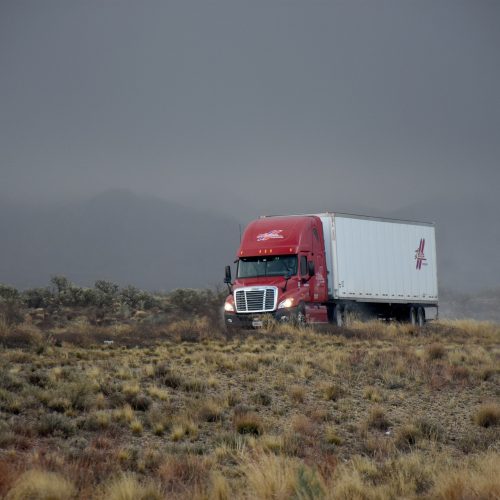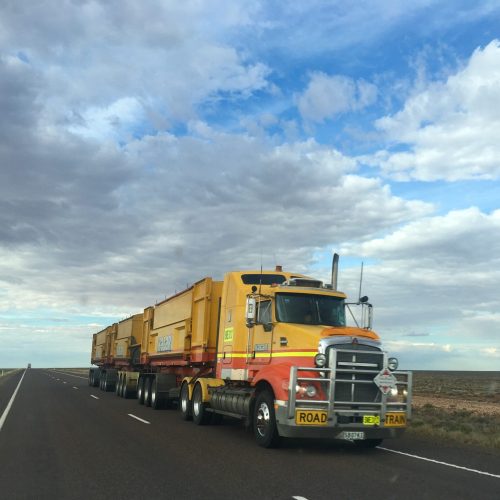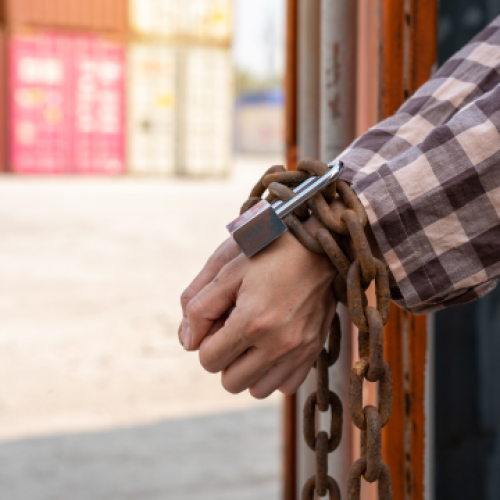Broadcast Library
The NJC is proud to host a multitude of engaging podcasts and webinars, with some webinars tailored to meet the specific needs of different states.
State-Specific Webinars

Traffic Jam: How Commercial Drivers Impact Human Trafficking in Courts
Course Description:
This webcast explores the complex and pressing issue of human trafficking (both labor and sex) through the lens of judicial leadership and commercial transportation. This session sheds light on how commercial motor vehicle (CMV) drivers can play a pivotal role in perpetuating and preventing human trafficking crimes. Participants are guided through foundational frameworks, federal and state legal structures, and real-world implications of trafficking. Emphasis is placed on breaking myths, spotting signs of exploitation, and fostering proactive judicial responses in local contexts.
Course Objectives:
After this course, participants will be able to:
-
Understand the forms, tactics, and prevalence of human trafficking, including distinctions between sex and labor trafficking.
-
Gain practical strategies for identifying trafficking indicators and effectively respond to cases in judicial and community contexts, and
-
Comprehend the unique legal frameworks affecting Commercial Driver’s License (CDL) holders, particularly the implications of trafficking-related convictions under the No Human Trafficking on Our Roads Act.
Alabama Alaska Arizona Arkansas California Colorado Connecticut Delaware Florida Georgia Hawaii Idaho Illinois Indiana Iowa Kansas Kentucky Louisiana Maine Maryland Massachusetts Michigan Minnesota Missouri Montana Mississippi Nebraska Nevada New Hampshire New Jersey New Mexico New York North Carolina North Dakota Ohio Oklahoma Oregon Pennsylvania Rhode Island South Carolina South Dakota Tennessee Texas Utah Vermont Virginia Washington Washington D.C. West Virginia Wisconsin Wyoming

Ethically Handling Commercial Drivers in Criminal & Traffic Courts
Course Description:
Every year, over half a million crashes on American highways involve commercial motor vehicles. These crashes result in enough fatalities to wipe out the entire population of more than any one of half of America’s towns. Many involve repeat violators, some of whom would not have been on the road if Federal and state CDL/CMV laws were properly and ethically enforced.
Judges who handle cases involving commercial driver’s licenses and commercial motor vehicles are often unaware of Federal regulations and state laws that require courts to treat commercial drivers differently than noncommercial drivers, even when a traffic violation has been committed in a personal or family vehicle.
This subject is one all judges must understand. Most misdemeanor and felony court judges don’t realize these laws may apply to cases where no traffic violation is even alleged. Many high-volume traffic courts are unaware of the need to establish special procedures for the handling of CDL/CMV cases.
Course Objectives:
After this course, participants will be able to:
• Identify applicable Federal and state CDL/CMV laws;
• Determine what constitutes “masking”;
• Discover the unique definition of a “conviction” under CDL/CMV laws;
• Recognize the legal, financial and social consequences of failures to enforce CDL/CMV laws;
• Detect the ethical implications of mishandling CDL/CMV cases;
• Apply recent expungement laws to holders of commercial driver licenses; and
• Develop ethical and efficient procedures for the handling of CDL/CMV cases in your court.

Access to Justice for Commercial Drivers
Course Description:
Every year, over half a million crashes on American highways involve commercial motor vehicles. These crashes result in enough fatalities to wipe out the entire population of more than any one of half of America’s towns. Many involve repeat violators, some of whom would not have been on the road if Federal and state CDLs/CMVs laws were properly and ethically enforced.
Increasingly, the modern-day Traffic and Criminal Court is experiencing higher volume and fewer resources. Despite this trend, Access to Justice remains imperative especially when balanced against the need to address cases requiring specialized attention such as CDL drivers who are prohibited from engaging in certain plea agreements. Judges who handle cases involving CDLs/CMVs are often unaware of federal regulations and state laws that require courts to treat commercial drivers differently than non-commercial drivers. This webinar will explore issues of both Access to Justice and Procedural Justice as juxtaposed against the concerns of CDL holders.
Course Objectives:
After this course, participants will be able to:
-
Identify applicable Federal and state CDL/CMV laws;
-
Determine what constitutes “masking”;
-
Discover the unique definition of a “conviction” under CDL/CMV laws;
-
Summarize the major components related to Access to Justice;
-
Hone techniques designed to improve in-court caseflow management and
identify CDL cases with potential masking problems;
-
Balance Procedural Fairness concerns to avoid federal masking violations; and
-
Develop ethical and efficient procedures for the handling of CDL/CMV cases in
your court.

Fundamentals of “Masking” and Suspensions for CDL Holders in Traffic and Criminal Courts
Course Description:
The practice of “masking” violations or the unwarranted reduction of charges for Commercial Drivers in Traffic and Criminal Courts across America is fairly common. When CDL drivers are afforded these opportunities, they often lead to less safe roads and highways for all drivers and passengers. Additionally, the likelihood of more crashes involving CDL holders is increased, which often leads to severe injury or death. To combat this challenge, it is necessary for judges, as the guardrails of the judicial system, to be aware of the basic rules which govern CDL holders by reporting convictions and imposing license suspensions where required by law. This course will provide judges the necessary information and tools to identify, address and combat and respond to “masking” when cases appear in the courtroom.
Course Objectives:
After this course, participants will be able to:
-
Identify applicable Federal and state CDL/CMV laws;
-
Determine what constitutes “masking”;
-
Discover the unique definition of a “conviction” under CDL/CMV laws;
-
Summarize the major components related to Access to Justice;
-
Hone techniques designed to improve in-court caseflow management and identify CDL cases with potential masking problems;
-
Balance Procedural Fairness concerns to avoid federal masking violations;
-
Develop ethical and efficient procedures for handling of CDL/CMV cases in their courts.
National Webinars

Putting the Brakes on Human Trafficking
Course Description:
This webcast equips participants to identify forms of human trafficking, apply relevant laws and penalties for CDL holders, and recognize key indicators to enhance enforcement and victim protection efforts.
Course Objectives:
After this course, participants will be able to:
● Identify and define forms of human trafficking;
● Understand and apply human trafficking laws and penalties relative to CDL holders, and,
● Recognize human trafficking indicators.

Gridlocked Human Trafficking at a Glance
Course Description:
This webcast dispels common myths about human trafficking, guides participants to identify and define its forms, apply related laws and penalties to CDL holders, and recognize key trafficking indicators.
Course Objectives:
After this course, participants will be able to:
● Dispel myths of human trafficking
●Identify and define forms of human trafficking;
●Understand and apply human trafficking laws and penalties relative to CDL holders, and,
●Recognize human trafficking indicators.

Harnessing Technology to Monitor Substance Use in Impaired Driving Cases
Course Description:
This course helps participants compare and contrast monitoring devices, select the appropriate tools for varied situations, and integrate technology effectively into their court’s monitoring plans.
Course Objectives:
After this course, participants will be able to:
● Compare and contrast different monitoring devices
● Identify the appropriate monitoring device for different situations.
● Integrate technology into your court’s monitoring plan.

Impaired Driving and Alcohol/Drug Issues within Commercial Drivers’ License (CDL) and Commercial Motor Vehicle Cases
Course Description:
This national webcast provides judges with a comprehensive overview of current laws and emerging issues related to impaired driving within the context of Commercial Drivers’ License (CDL) and Commercial Motor Vehicles (CMV) cases. Topics include the federal and state legal frameworks governing alcohol and drug use among commercial drivers, with a particular focus on marijuana-related offenses and enforcement challenges.
Course Objectives:
After this course, participants will be able to:
● Identify current CDL/CMV alcohol and drug impaired driving elements and issues;
● Explain the concept of “masking” within CDL/CMV cases and recognize its state & federal impacts; and
● Reinforce foundational knowledge of current compliance requirements for CDL/CMV impaired driving cases.

Why Judge? “Unmasking” Procedural Fairness and Empathy for Self-Represented Litigants in Court
Course Description:
This webcast explores the concept of “masking” by self-represented litigants (SRLs) holding a Commercial Driver License (CDL), and its impact on procedural fairness. Masking occurs in everyday court adjudication procedures. When adjudicating SRLs, the language needs to be and appear “respectable” and avoid negative judgments within the courtroom. The presentation will examine how court discretion, implicit expectations of respectability, and the absence of active listening and empathy can impact SRLs’ judgements. Participants will learn to exercise these abilities while still upholding judicial ethical duties. Participants will gain insights into fostering courtroom practices that uphold procedural fairness while recognizing and responding to masking behaviors.
Course Objectives:
After this course, participants will be able to:
● Define masking in the context of CDL self-represented litigants and explain how it impacts procedural fairness and perception of credibility in court.
● Describe how respectability norms, court discretion, and language expectations can denigrate the challenges with CDL-SRLs and identify strategies to mitigate these barriers while maintaining judicial ethics.
● Demonstrate the use of active listening and empathy to recognize and appropriately respond to masking behaviors with ethos, fostering fair and respectful courtroom interactions.
Podcasts

“Masking” conceals unsafe commercial drivers making roadways hazardous
“Masking” is a term used for when people with commercial driver’s licenses (CDLs) get lenient treatment in our nation’s courts. This allows offenders to hide their traffic offenses and stay on our highways without retribution.
Masking, although too often commonplace, is actually a violation of federal law and prohibited and states could get in trouble if their judges do not comply, according to retired Judge Gayle Williams-Byers.
Listen to this podcast to find out more:

Come To Order – Human Trafficking – Episode One
Come on the road with The National Judicial College Judicial Ambassadors as they educate judges on a wide variety of topics related to keeping America’s highways safe including CDL issues, masking, autonomous vehicles, human trafficking and more. If it happens on the highway, we talk about it here.
Episode One: An Overview of Human Trafficking for Judges – August 27, 2025
This episode is the first in a four-part series on human trafficking and what judges need to know to address this issue in their courts and communities. All episodes in the series were recorded during a judicial human trafficking leadership workshop held at The National Judicial College. This first episode focuses on the definition of human trafficking and when and where judges are likely to encounter victims and others.
Guests include:
Judge Gayle Williams-Byers, a judicial fellow at the NJC and a retired judge from Ohio. Aaron Ann Cole of Funfsinn of Hicks & Funfsinn in Lexington, Kentucky. Previously, she worked as a prosecutor in Cook County, Illinois, in the special prosecution unit in the Kentucky Attorney General’s Office, and in the special prosecution unit of the Fayette County Commonwealth Attorney’s Office. She is on the faculty at the National Judicial College.
Judge Chris Turner, a Magistrate Judge in the Third Judicial District in Shawnee County Kansas.

Come To Order – Human Trafficking – Episode Two
Come on the road with The National Judicial College Judicial Ambassadors as they educate judges on a wide variety of topics related to keeping America’s highways safe including CDL issues, masking, autonomous vehicles, human trafficking and more. If it happens on the highway, we talk about it here.
Episode Two: The Judge’s Guide to Understanding the Systems Behind Human Trafficking – August 29, 2025
This is the second episode in a series designed to help judges understand human trafficking. This episode focuses on the often complex systems behind human trafficking and help explain some of the challenges in adjudicating these cases.
Guests include:
Dr. Jeanne Allert, the founder and director of the Institute for Shelter Care, a national initiative to address gaps in service and quality for victims of exploitation. She is also the founder of The Samaritan Women. She holds a PhD in Counseling and Psychological Studies.
Lindsey Lane, the director of strategic engagement at the Human Trafficking Institute in Georgia. She formerly was a human trafficking prosecutor and assistant district attorney in North Carolina and a senior assistant district attorney in Tennessee’s Third Judicial District.

Come To Order – Human Trafficking – Episode Three
Come on the road with The National Judicial College Judicial Ambassadors as they educate judges on a wide variety of topics related to keeping America’s highways safe including CDL issues, masking, autonomous vehicles, human trafficking and more. If it happens on the highway, we talk about it here.
Episode Three: How Bias May Prevent Judges From Recognizing Human Trafficking – September 25, 2025
This episode continues our series on human trafficking and what judges need to know and what they can do to help address this issue in their communities. It explores how biases may prevent judges from recognizing human trafficking in their courtrooms.
Guests include:
Dr. Joseph A. Vitriol, an assistant professor at Lehigh University in Pennsylvania. He holds a Ph.D. in social-personality and political psychology from the University of Minnesota, Twin Cities, and a BA/MA in forensic psychology from John Jay College of Criminal Justice.
Dr. Christine McDermott, who is a research fellow at the National Judicial College. She earned her Ph.D. and master’s in interdisciplinary social psychology from the University of Nevada, Reno and her bachelor’s degree from the University of Colorado, Colorado Springs.

Come To Order – Human Trafficking – Episode Four
Come on the road with The National Judicial College Judicial Ambassadors as they educate judges on a wide variety of topics related to keeping America’s highways safe including CDL issues, masking, autonomous vehicles, human trafficking and more. If it happens on the highway, we talk about it here.
Episode Four: How The Trucking Industry Is Fighting Human Trafficking & What Judges Need To Know – September 26, 2025
This is the final episode of our four-part series on human trafficking and what judges need to know and what they can do to help address this issue in their communities. This episode focuses on how the trucking industry is fighting human trafficking and how that may impact how cases end up before a judge.
Guests include:
Jake Elovirta, the Director of Enforcement Programs for the Commercial Vehicle Safety Alliance; Judge Chris Turner, who is a Magistrate Judge and director of Judicial Outreach in the Third Judicial District in Shawnee County Kansas; and Dylan Wecht, a Public Sector Engagement Specialist for Truckers Against Trafficking.

Come to Order – Autonomous Vehicles – Episode One
Come on the road with The National Judicial College Judicial Ambassadors as they educate judges on a wide variety of topics related to keeping America’s highways safe including CDL issues, masking, autonomous vehicles, human trafficking and more. If it happens on the highway, we talk about it here.
Episode One: Autonomous Vehicles – December 2, 2024
The first of a four-part series on autonomous vehicles, this episode introduces judges to levels 0-2 vehicles in the autonomous vehicle taxonomy and discusses emerging legal issues starting to appear in courtrooms. Level 1 and Level 2 (which includes Tesla cars and trucks) are prevalent on the roads across the country today. Judicial Ambassadors Judge Thomas Fowler from Arkansas and Judge Gayle Williams-Byers lead the discussion. Hosted by NJC Communications Director Barbara Peck.

Come to Order – Autonomous Vehicles – Episode Two
Come on the road with The National Judicial College Judicial Ambassadors as they educate judges on a wide variety of topics related to keeping America’s highways safe including CDL issues, masking, autonomous vehicles, human trafficking and more. If it happens on the highway, we talk about it here.
Episode Two: Autonomous Vehicles – December 9, 2024
This episode of Come to Order continues the discussion on autonomous vehicles, focusing on level 4 and level 5 vehicles. The judges discuss the future of passenger vehicles at this level as well as commercial level 4 vehicles that are on the road today.

Come to Order – Autonomous Vehicles – Episode Three
Come on the road with The National Judicial College Judicial Ambassadors as they educate judges on a wide variety of topics related to keeping America’s highways safe including CDL issues, masking, autonomous vehicles, human trafficking and more. If it happens on the highway, we talk about it here.
Episode Three: Autonomous Vehicles – December 30, 2024
In the third episode in our series on autonomous vehicles, Judge Fowler and Judge Williams-Byers analyze how advancements in vehicle technology could impact impaired driving cases. When do drivers have actual physical control over autonomous vehicles and what impact will a law’s use of the word operating versus driving impact a case? Tune in to find out!

Come to Order – Autonomous Vehicles – Episode Four
Come on the road with The National Judicial College Judicial Ambassadors as they educate judges on a wide variety of topics related to keeping America’s highways safe including CDL issues, masking, autonomous vehicles, human trafficking and more. If it happens on the highway, we talk about it here.
Episode Four: Autonomous Vehicles – January 16, 2025
In this fourth and final episode on autonomous vehicles, Judges Fowler and Williams-Byers analyze the probable cause and privacy issues that arise with autonomous vehicles. How are level one and two autonomous vehicles hindering basic traffic stops today and what happens if police stop a fully autonomous vehicle with no driver? Judges, listen to find out!
Other Media

Human Trafficking Prevention Act of 2022
The Human Trafficking Prevention Act of 2022, passed by Congress on December 27, 2022, strengthens the Trafficking Victims Protection Act of 2000 by requiring the National Human Trafficking Hotline number to be publicly displayed in high-traffic U.S. locations such as government buildings, airports, buses, trains, and ports of entry. Signs must be placed in visible and/or discreet areas, including restrooms, to ensure accessibility for potential victims.

Tools That Teach: What is Human Trafficking?
“Tools That Teach: What is Human Trafficking?” from the U.S. Department of Homeland Security’s Blue Campaign explains that human trafficking is the use of force, fraud, or coercion to exploit people for labor or commercial sex. The resource highlights that victims can be of any age, gender, or nationality, and traffickers often disguise their activities as legitimate opportunities or relationships. Because victims may be fearful, manipulated, or isolated, they are often invisible to the public. The video stresses the importance of learning to recognize indicators of trafficking and reporting suspicions to authorities or the National Human Trafficking Hotline rather than intervening directly, as identifying and reporting warning signs can save lives.

Human Trafficking Truck Stop Awareness
This video depicts a human trafficking scenario taking place at a truck stop and shares how truck stop employees and truck drivers can report it. (DHS Video by Blue Campaign/Released)

Labor Trafficking Awareness
The following dramatized scenarios depict indicators of labor trafficking — a crime committed when a trafficker uses force, fraud, or coercion to compel another person to work for little or no wages. Human trafficking victims are often invisible because we do not recognize indicators of human trafficking. In this video, the CDL holder reacted quickly and decisively, recognizing the warning signs and providing the girls with the help they needed. Identifying signs of human trafficking and reporting a tip may save a life.
(DHS Video by Blue Campaign/Released)